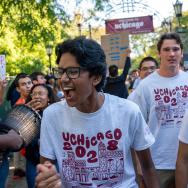In his Aims of Education address to new University of Chicago undergraduate students, Prof. Patrick Jagoda posed a playful, yet philosophical question that he often asks students in the courses he teaches.
“Is life a game?” asked the renowned scholar of media theory, game studies and design, on Thursday at Rockefeller Memorial Chapel. “You can take this question either as literal or figurative, structural or provocative, as you prefer.
“But I want you to contemplate, complicate and answer it for yourselves.”
Jagoda spent most of his address using various references of games, and more specifically, “play,” to explain his views of the purposes and aims of liberal education.
Be the Grasshopper
He began with telling the story of one of his own, unconventional role models—the grasshopper of Aesop’s well-known fable, The Ants & The Grasshopper.
In the original story, the starving grasshopper, who had spent his summer fiddling and playing music, came to the ants, who had spent their summer working and storing food for the winter, and begged for food. The ants refused, for, as Aesop wrote: “There is a time for work and a time for play.” While the grasshopper, deemed silly and lazy, is always portrayed as the villain in most retellings of the fable, Jagoda highlighted philosopher Bernard Suit’s version, in which the grasshopper recounts a dream to the ants just before it dies.
In the dream, everyone going about their ordinary lives—from carpenters to politicians to lovers to thieves—are actually engaged in playing elaborate games. The ants try to reason with the grasshopper, insisting that a balance of work is necessary for play, but “the grasshopper isn’t interested in being reasonable; it holds onto the principle of a life devoted entirely to play,” Jagoda said.
He noted other scholars over the course of history have likened much of life as a game—from social scientists to economists. He delved into how games have dominated popular culture from video games like Grand Theft Auto to feature films like The Hunger Games. Jagoda also spoke on how games have played a central part in the development of AI and machine learning, dating back to AI programs defeating world-champion chess and Go players.
Games also offer a space for collaboration, risk-taking and “safe failure”—and Jagoda encouraged students to do so during their time at UChicago.
“I hope there are moments that learning surprises, even confounds you,” Jagoda said. “I hope this leads to frequent moments at which you don’t understand yourself anymore. To put this even more forcefully: "I hope you fail early and often.”
But that failure, he added, should come in ways in which students can learn and then recover on their ways to solving global problems such as climate change, structural inequality or massive cybersecurity failures.
Learn how to ‘play’
Part of that trial-and-error process, Jagoda explained, comes with not just games, but play.
“To be clear: I enjoy games, but I cannot live without play,” Jagoda said. “.... Play is not necessarily childish. At its best, it makes you childlike, which has been a lifelong goal for me…play is another word for experimentation, which is another word for learning. If you approach learning that way, you don’t engage in it for merely four years; you commit to it for a lifetime.”
The son of Polish immigrants, Jagoda spent the early years of his life in Austria and Australia, and by the time he was an undergraduate student in the United States, he didn’t know what he could gain from a liberal arts education. He started as a philosophy and literature double major, later earned a Ph.D. in English, but now designs games with medical professionals, climate scientists, and theater makers. He even created a video game for new students to play before arriving at UChicago, which explored topics including free expression, open discourse and difference.
His advice to students? Start designing your “game of education” as soon as possible—and strive to be the grasshopper in the story.
“Use your passions, your convictions and your shared intelligence to make the world better,” he said. “Share your goals with your new friends, organize yourselves in teams, draw from the University as a constellation of resources that will help you sharpen and pursue your emergent vision.
“In other words: Enjoy your shared agency, and play together.”

